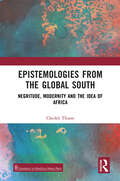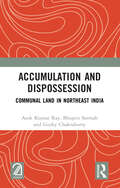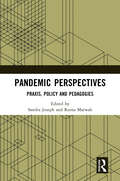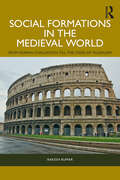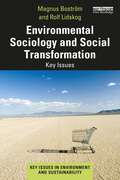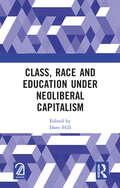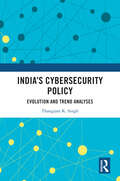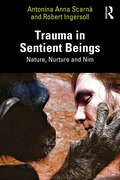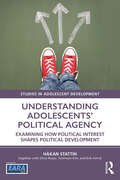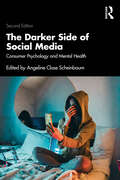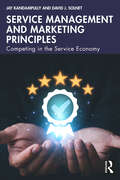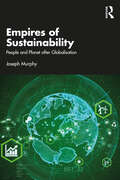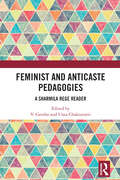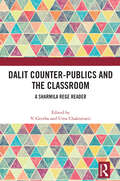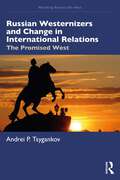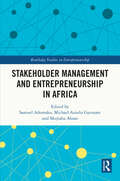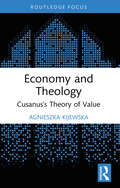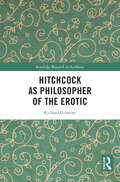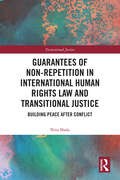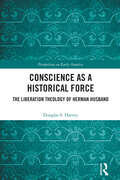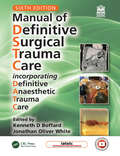- Table View
- List View
Epistemologies from the Global South: Negritude, Modernity and the Idea of Africa
by Cheikh ThiamThis book argues that the pervasiveness of the modern paradigm and its corollary, the colonial matrix of power, have led scholars of Negritude to think of Leopold Sedar Senghor’s work either as an anti-thesis to the anti-Blackness constitutive of European modernity or as another manifestation of the West as subject of history. As opposed to this tradition, the book reads Negritude through the prism of endogenous African world views without the filter of the modern Western paradigm.Print edition not for sale in Sub Saharan Africa.
Accumulation and Dispossession: Communal Land in Northeast India
by Gorky Chakraborty Asok Kumar Ray Bhupen SarmahThis book sketches a road map of privatisation, accumulation and dispossession of communal land in the tribal areas of North East India from pre-colonial times to the neo-liberal era.Spread over five chapters, this study unfolds the privatisation of communal land in the backdrop of a larger theoretical and historical canvas. It deals with the different institutional modes of privatisation, accumulation and dispossession of communal land, the changes in land use and cropping patterns, the changes in land relations and the land-based identity of the tribal community as a result. The conclusive chapter makes a broader reflection of the grand narrative of privatisation, accumulation and dispossession of communal land in North East India.This title is co-published with Aakar Books. Print edition not for sale in South Asia (India, Sri Lanka, Nepal, Bangladesh, Pakistan and Bhutan)
Pandemic Perspectives: Praxis, Policy and Pedagogies
by Reena Marwah Sandra JosephThe book explores the impacts of the COVID-19 pandemic on nations across the globe since early 2020. It hosts a variety of perspectives within economic, social and development research studies, providing contemporary and proper information. The book also presents policy prescriptions for developing economies, critiques the system of disease surveillance and waste management, and defines a vision for India's development. It also mirrors issues related to digitisation, marginalisation, government regulations and health systems and provides original ideas for innovative methodologies suitable for higher education.Print edition not for sale in South Asia (India, Sri Lanka, Nepal, Bangladesh, Pakistan and Bhutan)
Social Formations in the Medieval World: From Roman Civilization till the Crisis of Feudalism
by Rakesh KumarThis book encapsulates a period of history of human progress by highlighting crucial social, economic, and cultural dynamics. It presents recent historiography and new analytical tools used to analyse multi-dimensional themes involved in social formation. This is a reader-friendly book with simple and lucid language and fulfils the pressing needs of students studying the paper ‘Social Formations and Cultural Patterns of Ancient and Medieval World’ at various universities across the world. The summary, keywords, and representative questions at the end of each chapter would assist in revision and better understanding of the issues dealt therein. A detailed chapter-end reference would enable and motivate the readers to engage in further studies for better understanding of the themes.This book will be of interest to students, researchers, and academics in the area of history—ancient and medieval world history in particular and anthropology. It will also be an interesting read for general readers interested in knowing about the ancient and medieval world.
Environmental Sociology and Social Transformation: Key Issues (ISSN)
by Rolf Lidskog Magnus BoströmEnvironmental Sociology and Social Transformation demonstrates how sociological theory and research are critical for understanding the social drivers of global environmental destruction and the conditions for transformative change.Written by two professors of sociology who are deeply involved in the international community of environmental sociology, Magnus Boström and Rolf Lidskog argue that we need to better understand society as well as the fundamentally social nature of environmental problems and how they can be addressed. The authors provide answers to why so many unsustainable practices are maintained and supported by institutions and actors despite widespread knowledge of their negative consequences. Employing a pluralistic sociological approach to the study of social transformations, the book is divided into five key themes: Causes, Distributions, Understandings, Barriers, and Transformation. Overall, the book offers an integrative and comprehensive understanding of the social dimension of (un)sustainability, societal inertia, and conditions for transformative change. It provides the reader with references from classic and contemporary sociology and uses pedagogical features including boxes and questions for discussion to help embed learning.Arguing that a broad and deep social transformation is needed to avoid a global civilization crisis, Environmental Sociology and Social Transformation will be a great resource for students and scholars who are exploring current environmental challenges and the societal conditions for meeting them.
Class, Race and Education under Neoliberal Capitalism
by Dave HillWith the onset of Austerity Capitalism and Immiseration Capitalism, and with the increasing commodification, marketisation and privatisation of society and of education, Marxist Theory and Marxist Education Theory have taken on a new urgency.In this collection of essays, written from a classic Marxist perspective, Dave Hill lays bare how the capitalist class in the knowledge industry/academia, use ideological (and repressive) state apparatuses, such as education, to divide, disarm and demoralise critical, Marxist analysis and activism.This title is co-published with Aakar Books. Print edition not for sale in South Asia (India, Sri Lanka, Nepal, Bangladesh, Pakistan and Bhutan)
India’s Cybersecurity Policy: Evolution and Trend Analyses
by Thangjam K. SinghThis book examines India’s public policies on cybersecurity and their evolution over the past few decades. It shows how threats and vulnerabilities in the domain have forced nation-states to introduce new policies to protect digital ecosystems. It charts the process of securitisation of cyberspace by the international system from the end of the 20th century to the present day. It also explores how the domain has become of strategic interest for many states and the international bodies which eventually developed norms and policies to secure the domain.Consequently, the book discusses the evolution of cybersecurity policy at global level by great powers, middle powers, and states of concern and compares them with the Indian context. It also highlights the requirement of introducing/improving new cybersecurity guidelines to efficiently deal with emerging technologies such as 5G, Artificial Intelligence (AI), Big Data (BD), Blockchain, Internet of Things (IoT), and cryptocurrency.The book will be of great interest to scholars and researchers of cybersecurity, public policy, politics, and South Asian studies.
Trauma in Sentient Beings: Nature, Nurture and Nim
by Robert Ingersoll Antonina Anna ScarnàThis is a book about the bond between sentient beings. It explores the non-verbal space between two entities, and asks questions like: What is a healthy human being? Is it nature? Nurture? Nature via nurture? How are we born with personality traits, emotion, mood, language abilities, and intelligence? What do we know about attachment, family structure, and genetic inheritance?Dr Anna Scarnà and Robert Ingersoll use the life history of the chimpanzee, Nim Chimpsky and his family: parents Carolyn and Pan, companion Lilly, their daughter, Sheba, and an assortment of human carers, to explain the hallmarks of healthy human psychological development. What makes humans "human", and chimpanzees, "chimpanzees"? Do chimpanzees have a personality, or should we consider them to have a “chimpanality?”Robert, close friend and carer of Nim, gives the facts about Nim’s upbringing and first-degree relatives, and Anna reports with reference to theories of brain, personality, self, and language. Together they explain what can be drawn from psychological research and reanalyse the chimpanzee work from the 1960s and 1970s in order to honour and respect the memory of those animals.
Cadaver Dissection with Clinical Applications
by Seth GardnerCadaver Dissection with Clinical Applications is written for students in a professional program that have been given the privilege of dissecting their own cadaver. It discusses dissection techniques, what structures to look for in a particular region and various pitfalls to avoid in the process. The Manual also relates regional anatomical structures with clinical relevance by listing various syndromes, relevant orthopaedic tests, selected X-ray findings and associated pathologies that relate to the region being dissected. It is a terrific resource for all students who will one day see patients in a clinical setting, by first learning anatomical relevance on a cadaver.
Understanding Adolescents’ Political Agency: Examining How Political Interest Shapes Political Development (Studies in Adolescent Development)
by Håkan StattinThis ground-breaking volume shows that young people largely shape their own political development, and that to understand young people's political development, we must consider their political agency.Håkan Stattin explores the findings of an extensive longitudinal study of the political socialization of young people in Sweden from the ages of 13 to 28, which shows that, contrary to popular belief, it is not parents, peers, teachers or other key adults who are the primary agents in shaping young people's political development; it is their own self-directed political interest. Given that political interest is both an input and an output, the book examines how political interest affects young people's political interactions with their parents, and why young people and their parents perceive these interactions differently. It covers key issues such as the impact of political-interest-triggering events and civil unrest, the role of school and peers, parental involvement and the path from political interest to future political and civic engagement.Launching a new field of research internationally, this volume is essential reading for researchers, students, educators, and policy developers interested in young people's political and civic attitudes, engagement, communication, core values and the emergence of intrinsic political sophistication.
Activism in Hard Times in Central and Eastern Europe: People Power (Innovations in International Affairs)
by Patrice C. McMahon Dorota Pietrzyk-Reeves Paula M. PickeringActivism in Hard Times in Central and Eastern Europeelevates the voices of civic activists from Central and Eastern Europe (CEE) and analyzes a wealth of information to generate new insights into how activism in the region manages to be vibrant, diverse, and consequential.Because of these countries’ unique historical trajectory, CEE activists have, in important ways, leap-frogged their counterparts in the West. Giving special attention to activists in Bosnia and Herzegovina (BiH), Hungary, Poland, Russia, and Ukraine, the book focuses on responses to the recent “hard times” – the shrinking of public space for civil society, democratic backsliding, polarization, and Russia’s war in Ukraine. The contributors contend that CEE activists provide important lessons for others confronting similar challenges around the world.The book is well-suited for a variety of undergraduate and graduate courses, such as comparative politics, human rights, global governance, social movements, Central and East European politics, and contemporary world politics. This timely and readable book, co-created by academics and activists and written in a conversational tone, will also be of interest to the interested public and practitioners. The book encourages readers to think differently about the role of civil society and activism, as well as about how new tools and polarizing dynamics affect activism in this region.Chapters 2, 3, 6 and 8 of this book are freely available as downloadable Open Access PDFs at http://www.taylorfrancis.com under a Creative Commons Attribution-Non Commercial-No Derivatives (CC-BY-NC-ND) 4.0 license.
Scientific Method: How Science Works, Fails to Work, and Pretends to Work
by John StaddonThis expanded second edition of Scientific Method shows how science works, fails to work or pretends to work by looking at examples from physics, biomedicine, psychology, sociology and economics.Scientific Method aims to help curious readers understand the idea of science, not by learning a list of techniques but through examples both historical and contemporary. Staddon affirms that if the reader can understand successful studies as well as studies that appear to be scientific but are not, they will become a better judge of the “science” in circulation today. To this end, this new edition includes a new chapter, What is Science?, which points out that science, like any human activity, has its own set of values, with truth being the core. Other new chapters focus on the emergence of AI and machine learning, science and diversity, and behavioral economics. The book also includes textual features such as bullet-points and text boxes on topical issues.Scientific Method is essential reading for students and professionals trying to make sense of the role of science in society, and of the meaning, value and limitations of scientific methodology.
The Darker Side of Social Media: Consumer Psychology and Mental Health
by Angeline Close ScheinbaumThe Darker Side of Social Media: Consumer Psychology and Mental Health takes a research-based, scientific approach to examining problematic issues and outcomes that are related to social media use by consumers. Now in its second edition, it relies on psychological theories to help explain or predict problematic online behavior within the social media landscape through the lens of mental health.With an aim to provide solutions, the authors spotlight the key issues affecting consumer well-being and mental health due to the omnipresence and overuse of social media. The book dissects the unintended consequences of too much social media use, specifying key problems like disconnection anxiety, eating disorders, online fraud, cyberbullying, the dark web, addiction, depression, self-discrepancies, and serious privacy concerns (especially impacting children or young people). The book provides grapples with mental health disorders such as anxiety, depression, self-harm, and eating disorders that can be intensified by, or correlated with, too much social media use. The authors meticulously review the various facets of the darker side of online presence and propose actionable solutions for each of the problems stated, providing scholars with a conceptual model with propositions for continued research.This international exploration of social media is a must-read for students of marketing, advertising, and public relations, as well as scholars/managers of business, marketing, psychology, communication, management, and sociology. It will also be of interest to social media users, those navigating new media platforms parents, policymakers, and practitioners.
Service Management and Marketing Principles: Competing in the Service Economy
by Jay Kandampully David J. SolnetThis book explores the service economy and challenges that all organizations face as goods and services make way for a world where customers (B2C) and businesses (B2B) seek seamless, thoughtful, and exceptional experiences. This book introduces readers to a range of interrelated topics and the application of service management and marketing theories which are fundamentally critical to the success of all enterprises seeking competitive advantage through enhanced customer experience.This book analyses management and marketing challenges in the service and experience economy and provides insights into how marketers and managers can strike a balance between supply, demand, price, and quality and leverage technology for operational efficiency and to better manage customer service and expectations. Through the coverage of critical foundational topics, from how value is created; the evolution of global economies from goods, services to experiences; foundations of customer-centric management; managing service workers; integrating human touch with high-tech service; and many others, the authors provide a holistic understanding of management in a complex, globally interconnected world. This book will be useful for students, researchers, and instructors of business management, marketing, commerce, and economics. It will also be of interest to professionals working in healthcare, retail, financial services, government hospitality, leisure, tourism, and other services.
Empires of Sustainability: People and Planet after Globalisation
by Joseph MurphyFocussing on the greening of imperialisms and empires, Empires of Sustainability analyses the shift around the world from denial of the environmental crisis to action to prevent catastrophe, and the resulting implications.Evidence of this shift is clear in widespread and purposeful social change which is gathering momentum. The book explains how globalisation accelerated us towards the crisis, and today, even as its own legitimacy is being questioned, is evolving through solutions and responses to it. Looking ahead and as the environmental crisis worsens, two possible futures are discerned and explored. One is that through universal actions to save the planet, shaped by interweaving political and economic forces, the hegemony of globalisation is restored, albeit in a green form. The other is that the world reorganises into competing spheres of influence, with politics, economics and the environment interwoven differently in each case. In these ways, we face the prospect of one or more Empires of Sustainability emerging over the decades ahead, unless we build a better alternative society. The author presents an alternative: a more diverse World of Caring Places.This accessible book will appeal to students and scholars of international political economy, sustainability and environmental studies, and analysts, policy makers, campaigners and others concerned about the future of relations between people and planet.
Emerging Digital Technologies and India’s Security Sector: AI, Blockchain, and Quantum Communications
by Pankaj K Jha Vedant Saigal Arun Teja PolcumpallyThis book is an introductory account for policy makers, academia, and interested readers on the digital technologies on Indian Military. It covers three technologies – AI, Blockchain, and Quantum communications – and provides a detailed account on the military use cases. It evaluates the readiness of Indian Military in these technologies. A foundational text, it not only provides key policy analysis but also identifies the gray areas for the future research in the security studies.The volume will be essential reading for scholars and researchers of military and strategic studies, especially future warfare, AI and Blockchain, and South Asian studies. It will be of interest to general readers as well.
Feminist and Anticaste Pedagogies: A Sharmila Rege Reader
by Uma Chakravarti V. GeethaThis book comprises the collected essays of Sharmila Rege (1964 – 2013), which span a range of themes, including critical perspectives on women’s movements, Dalit standpoint feminism, and the relationship between Women’s Studies and other disciplines. Written over two decades and more (from the 1990s to 2010), these pioneering essays draw from the struggles and writings of Dalit women, the long history of anticaste thought in Maharashtra and global feminist debates. Equally, they address enduring concerns to do with caste and gender, and call attention to the inseparability of struggles against caste and patriarchy.Framed and annotated by an introduction that places Sharmila's work in the intellectual and historical contexts that shaped it, the volume also features short prefatory notes by her colleagues on the various themes taken up for discussion. Addressing, as it does, the researcher, the activist and the teacher, the book is indispensable for students and researchers of women’s studies, feminism, gender studies, Dalit studies, minority studies, Sociology, as well as studies in language and rhetoric.
Dalit Counter-publics and the Classroom: A Sharmila Rege Reader
by Uma Chakravarti V. GeethaThis book is an anthology of the collected essays of Sharmila Rege (1964 – 2013) that addresses themes to do with pedagogy and culture. Rege makes a compelling argument for rethinking the content of sociological knowledge and invokes in this context, Anticaste radical philosophies, associated with Mahatma Phule and Babasaheb Ambedkar as well as the writings of Dalit women. Equally, she seeks to rethink and engender the domain of Cultural Studies. She calls attention to 'Dalit counter-publics', comprising performance and commemorative traditions that are committed to ending the caste order and argues for a critical rethinking of the relationship between caste, sexuality, and popular culture.Framed and annotated by an introduction that places Sharmila's work in the intellectual and historical contexts that shaped it, the volume also features short prefatory notes by her colleagues on the various themes taken up for discussion. Addressing, as it does, the researcher, the activist and the teacher, the book is indispensable for students and researchers of Women’s Studies, feminism, gender studies, Dalit Studies, minority studies, Sociology, Cultural Studies, Performance Studies, as well as studies in language and rhetoric.
Russian Westernizers and Change in International Relations: The Promised West (ISSN)
by Andrei P. TsygankovRussian Westernizers and Change in International Relations summarizes the Westernizing trend in Russian thought from the early nineteenth century to the present day.This book looks at Russian thinkers and politicians who have considered Western/European civilization to be superior to others and who have drawn the conclusion that Russia consequently ought to align itself with the West, rather than preserving certain traditional Russian values – and that not doing so is an impediment to political, social, and economic evolution. Within this trend of thought, the author identifies four schools – Christian Westernizers, Economic Liberals, Political Liberals, and Social State Supporters – and explores examples of each. The author compares Russian thinkers from different periods, finding contrasts and similarities within their political and historical settings and assessing their responses to their unique circumstances. He analyzes Russian Westernizers’ self‑definition and ideas of national freedom relative to those of Western nations, exploring how the West’s definition of values and institutions has changed over time. He shows how Western historical developments affected waves of Westernization and pro‑Western thinking inside Russia, arguing the importance of this being grounded in national state‑building priorities. The growing complexity of global relations, the declining global influence of the West, and the war in Ukraine present Russian Westernizers with new questions and challenges, and this book assesses the resulting implications.This book will appeal to students and scholars of Russian foreign policy, Russia–West relations, IR theory, diplomatic studies, political science, and European history including the history of ideas.
Stakeholder Management and Entrepreneurship in Africa (Routledge Studies in Entrepreneurship)
by Samuel Adomako Michael Asiedu Gyensare Mujtaba AhsanBuilding on past research in the broad field of stakeholder management and entrepreneurship, this book pushes a new agenda for more effective stakeholder engagement and management in entrepreneurial firms in Africa.Adomako, Gyensare, and Ahsan provide a novel lens for entrepreneurs to manage stakeholders in Africa and a sense of current best practices. Issues discussed include how external stakeholders such as government, nongovernmental organizations, media, civil society organizations, and local institutions influence the core business operations of entrepreneurial firms. The book confronts the central challenge of entrepreneurship by providing a comprehensive understanding of how entrepreneurs could identify, select, enroll, and coordinate stakeholders. In addition, it assesses issues such as stakeholder influence on corporate social responsibility strategy, sustainability, and environmental management of entrepreneurial firms.An essential read for postgraduate students, researchers, and public and private analysts.
Economy and Theology: Cusanus’s Theory of Value (ISSN)
by Agnieszka KijewskaEconomy and Theology: Cusanus's Theory of Value, a study from the field of the history of philosophy, responds to the present-day interest in what is referred to as economic theology. This study aims to show that value (valor), one of the fundamental concepts of contemporary philosophy and economics, has its genealogy in the thought of Nicholas of Cusa. Starting from the economic context (the concept of price/pretium), Cusanus proposes the theory of value that, on the one hand, is objectively rooted in the Divine act of creation (God as the Minter) and, on the other hand, requires reading by human beings (human mind as a banker). While this theory appears in Cusanus’s late work The Bowling-Game, it is underpinned by his theory of knowledge, theory of human beings and human cognition against the background of his vision of the universe. Thus, the aim of the book is to try to answer the question about the role and tasks of human beings as a principal player in economic and social game. This description of human position emerges from the creative tension between human philosophical and theological reflection and certain economic solutions.
Hitchcock as Philosopher of the Erotic (Routledge Research in Aesthetics)
by Richard GilmoreThis book reads Alfred Hitchcock as a philosopher of what constitutes the erotic. The author argues that Hitchcock is doing a post-Nietzschean, postmodern kind of philosophy in which he is exploring and creating possibilities of what the erotic can feel like and how the erotic can be expressed.The erotic is a pervasive phenomenon in Hitchcock’s films. It involves irony, play, and sophistication, and there can be erotic failures as well as erotic successes. The erotic is most complexly explored by Hitchcock in his two masterpieces from the 1950s: Vertigo (1958), a story of the failure of the erotic, and North by Northwest (1959), in which the erotic is consummated in marriage. The author argues that Hitchcock has a philosophical theory about what makes the difference. It is a version of existential philosophy that understands what a person is to be based on what they make of themselves through their choices. The author argues that the erotic for Hitchcock is a process of mutual, reciprocal creation of the personality of the other person. This process is complicated by the fact that as one attempts to create the person one desires, one is simultaneously being created by that other person, and so what one desires is also in a process of being recreated in the mutual reciprocal dance of the erotic entanglement. There is a moral dimension to this because erotic failure is, in a way, a failure of the human, not in the sense of a human essence, but in the sense of realizing human possibilities that can make our lives more satisfying, complete, and full.Hitchcock as Philosopher of the Erotic will appeal to scholars and advanced students working on philosophy of film, film studies, and philosophy of love and sex.
Guarantees of Non-Repetition in International Human Rights Law and Transitional Justice: Building Peace after Conflict (ISSN)
by Nita ShalaThis book examines the understudied, yet increasingly applied, concept of Guarantees of Non-Repetition under international human rights law and transitional justice.Guarantees of Non-Repetition (GNRs) are measures taken to ensure that human rights abuses do not recur. They are especially crucial in post-war contexts marked by severe and systematic violations. However, although they are increasingly invoked, GNRs are not well understood, and they have so far received only limited theoretical and practical analysis. Tracing their development to the influence of international human rights law, this book considers what GNRs are, how and why they have come about, and how GNRs are implemented. Through an explication of the history, law and jurisprudence of GNR’s – in regional mechanisms in Latin America, Europe, and Asia, as well as in international bodies – the book maintains the increasing importance, and as yet unfulfilled potential, of this legal obligation in transitional justice settings.This first book to analyse the development of GNRs and their application will appeal to scholars in the areas of law and transitional justice, public policy, and socio-legal studies, as well as lawyers and policy-makers working in post-conflict situations.
Conscience as a Historical Force: The Liberation Theology of Herman Husband (Perspectives on Early America)
by Douglas HarveyConscience as a Historical Force is the first true analysis of the life and thought of the radically democratic eighteenth-century backcountry figure of Herman Husband (1724–1795) and his heavily metaphorical political and religious writings during the “Age of Revolution.”This book addresses the influence of religion in the American revolutionary period and locates the events of Herman Husband’s life in the broader Atlantic context of the social, economic, and political transition from feudalism to capitalism. Husband’s metaphorical reading of the Bible reveals the timeless nature of his message and its relevance today. Other studies of Herman Husband fail in this regard even though, this book argues, this is the most valuable lesson of his life. The debate over the importance of religion in the American Revolution has neglected its connection with both the English radicals of the seventeenth century and continental religious radicals dating back further still. Essentially, the “antinomian” movement, where individuals refused to acknowledge any power greater than that of their own conscience, was Atlantic in scope and dates to the origins of Christianity itself.With a chronological approach, this study is of great use to students and scholars interested in the politics and religion of eighteenth-century America.
Manual of Definitive Surgical Trauma Care: Incorporating Definitive Anaesthetic Trauma Care
by Kenneth D Boffard Jonathan Oliver WhiteDeveloped for the International Association for Trauma Surgery and Intensive Care (IATSIC), the Manual of Definitive Surgical Trauma Care 6e is ideal for training all surgeons and anaesthetists who manage trauma on an infrequent basis.The Manual is updated every 4 years and reflects the most recent developments in patient management based on new evidence-based information. Its focus is on the importance of the multidisciplinary care of the trauma surgical patient. This sixth edition has evolved, and the all-important section on the Non-Technical Skills which are required has been expanded. A significant number of the original guidelines in trauma have been archived, as they are no longer pertinent or have been superseded. The increasing (and occasionally harmful) role of non-operative management (NOM) has been recognized. The ‘Military Environments’ and ‘Austere Environments’ chapters have been substantially revised to reflect current multinational combat experience, and broadened to reflect modern asymmetrical conflicts and the increased need for humanitarian intervention including military peacekeeping in which only one side wears a uniform. Military weapons are used in major cities against the civilian population. More recently, urban, non-military populations have been the targets and victims of heavy military combat including use of ultra-sophisticated weaponry. Each situation carries its own spectrum of injury and responsibility of care.Including website access to a selection of videos which provide an anatomic overview of surgical approaches, this resource provides a gold standard educational and training resource to help prepare the relatively fully trained surgeon to manage the difficult injuries that might present to a major trauma centre.
